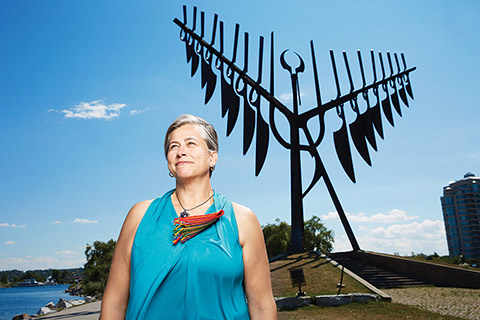Barely six weeks after being elected president of the Métis Nation of Ontario, Margaret Froh (LLB 1996) found herself on a canoe trip on the Ottawa River with Prime Minister Justin Trudeau. Invited along with other Indigenous leaders to celebrate National Aboriginal Day on June 21, Froh says the event reinforced her optimism about improving the lives of Métis people during her term of office.
“I think the fact that we had such a prominent role in marking the day is a signal of the government’s real movement to work on a nation-to-nation basis with us,” says Froh, a Métis lawyer and educator. She is the first female president of the association, which was founded in 1993 to represent Métis people in Ontario.
Trudeau’s call for a renewed relationship with the Métis Nation of Ontario and other Indigenous representative bodies could bring progress on housing, health, education and child welfare, says Froh. “There’s never been a federal government that’s been prepared to have this kind of dialogue.”
Froh’s other policy priorities over the next four years include promoting Métis land claims and self-government, and increasing political engagement among Métis youth. She says several political developments over the past two years will bolster her efforts, including Ontario legislation that recognizes the Métis Nation of Ontario’s governance structure, and the Truth and Reconciliation Commission’s report on the Indigenous experience in residential schools.
Growing up in the Qu’Appelle Valley in Saskatchewan, Froh says her family was surrounded by Métis people, but lacked a strong sense of their Indigenous identity. “My parents took a ‘We’re Canadian’ view. Being Métis was not something that was celebrated. And that’s not a unique story for Métis people.”
After attending the University of Prince Edward Island, Froh was inspired to apply to law school after helping an Ojibway-Potawatomi friend, Mary Pitawanakwat, with a human rights complaint against the federal government. “I saw the law as being a different and powerful language,” she says, “and if I could learn it, I could use it for our people.”
At U of T’s Faculty of Law, Froh found a supportive group of Indigenous students who eased her fears about fitting in. “I had some anxious moments. I was worried that I wouldn’t see myself reflected. But I made instant connections with people, and some of them are still my best friends.”
She helped launch the Kawaskimhon National Aboriginal Law Moot for Canadian law students, which incorporates principles of Indigenous law. A few years after graduating, she returned to the faculty as an adjunct professor for a course she helped design. Taught in the format of a traditional talking circle, it featured Indigenous guest speakers.
Froh has devoted much of her career to supporting strong and healthy Indigenous communities. Among other roles, she served as legal counsel for the Chippewas of Rama First Nation and was president of the Indigenous Bar Association.
“The stars are aligning for our nation,” says Froh. “This is an extraordinary time in the history of the Métis people, and an amazing time to be serving in this role.”
Watch: Margaret speaking about the recent Daniels vs. Canada decision






